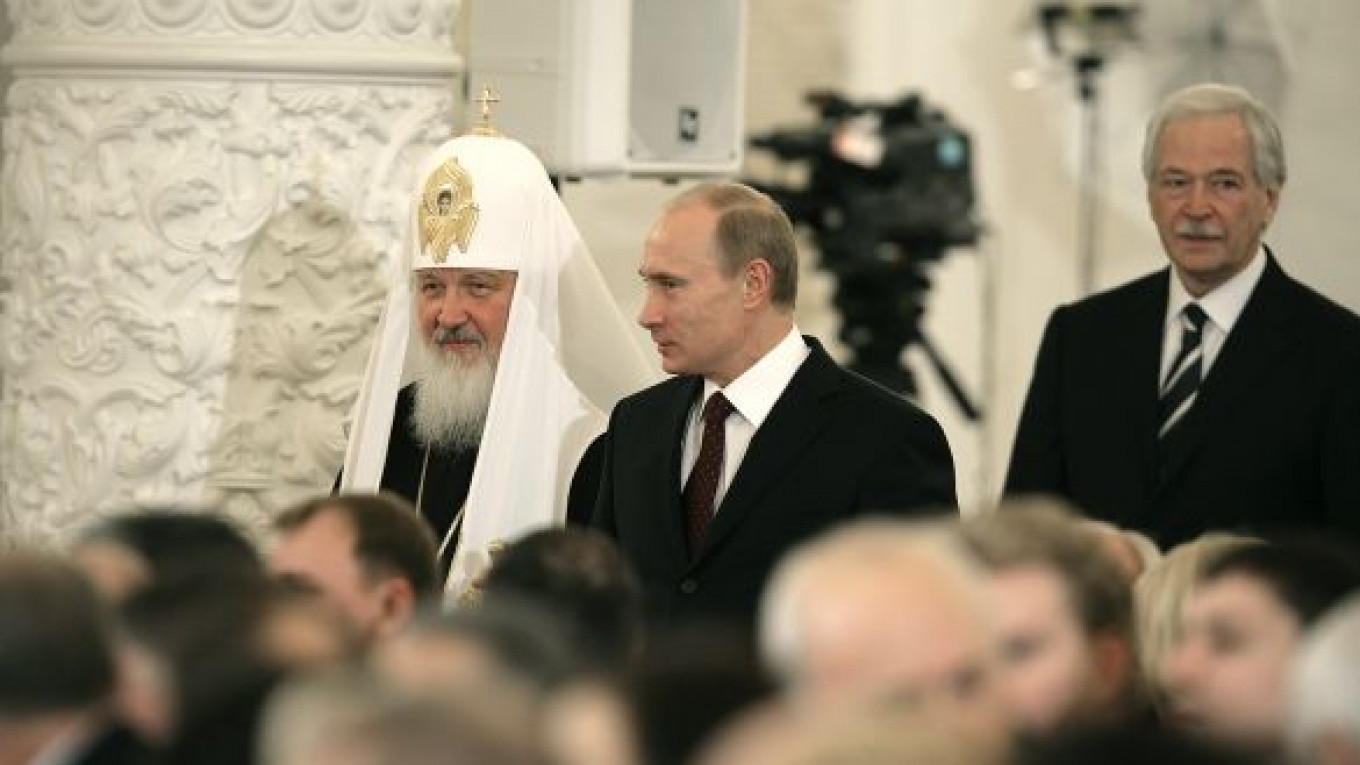The blogosphere, still in uproar over reports of "Putin's Palace," went into a new frenzy after rumors hit the web of another posh mansion, this time allegedly constructed for the head of the Russian Orthodox Church.
The project is officially intended to be a "spiritual and cultural center" for the church, but numerous critical bloggers, savoring photos of the unfinished building, were quick to rechristen it the "Patriarch's Dacha."
Environmental activists, who were the first to break news about the mansion, said the Office for Presidential Affairs is involved in the construction, which threatens an endangered forest on the Black Sea coast.
Environment Watch North Caucasus last week released photos of a large-scale construction site near the seaside village of Divnomorskoye in the Krasnodar region.
The photos show a huge posh building roofed with glass and sporting two satellite dishes and an onion-shaped dome typical of Orthodox churches.
Dmitry Shevchenko, an activist with Environment Watch North Caucasus, told The Moscow Times that the group examined the church-linked construction site last Wednesday, shortly after visiting the "palace" allegedly built nearby for Prime Minister Vladimir Putin.
"Of course, the 'Patriarch's Dacha' looks much more modest than 'Putin's Palace,' but it's clear that it's expensive," Shevchenko said in a telephone interview Monday.
Rumors about a $1 billion seaside residence, built in Gelendzhik by the Kremlin's property department for the prime minister, first surfaced in December. Spokespeople for the Kremlin and Putin denied the reports, but Novaya Gazeta published paperwork this month confirming the Office for Presidential Affairs' involvement in the project, though estimated in the documents at a mere 400 million rubles ($13 million).
The two projects began back-to-back in 2005, and a state enterprise owned by the Office for Presidential Affairs is involved in both, Shevchenko said.
A spokesman for the Office for Presidential Affairs, Viktor Khrekov, confirmed to The Moscow Times that its enterprise is taking part in the Divnomorskoye construction as "a general contractor," but said the agency is not financing the project.
"The federal state unitary enterprise is just fulfilling the order of the [Moscow] Patriarchate," Khrekov said. "The enterprise isn't paying for it, it's only commanding the workers."
Patriarch Kirill's spokesman in Moscow declined to comment on the issue Monday, directing inquiries to a Patriarchate department that could not be reached on the phone.
"I don't know anything about any palace," Vladimir Vigilyansky, head of the Moscow Patriarchate's press service, was quoted by Gazeta.ru as saying. "The patriarch has never paid a visit there, [and] never spoken on the issue."
It remained unclear to what extent the incumbent Patriarch Kirill, who only assumed office in 2009, is linked to the project.
The Divnomorskoye project was announced in 2005 by the governmental mouthpiece Rossiiskaya Gazeta, which said the construction of "the Moscow Patriarchate's only spiritual and cultural center in the south of the country" was decided during Kirill's predecessor Alexy's visit to Gelendzhik.
Environment Watch North Caucasus was unable to establish the identity of the mansion's owner during its trip to Divnomorskoye, activist Shevchenko said, adding that workers, most of them Serbians, refused to identify their employer and treated the visitors in a hostile manner.
The contractor is the Serbian company Putevi, which worked on the renovation of the Sochi International Airport, Shevchenko said.
Regardless of ownership, the project violates environmental legislation as it occupies some 10 hectares of land in an endangered forest where no construction is allowed, Environment Watch North Caucasus said.
The group has appealed to the local branch of the Federal Inspection Service for Natural Resources Use, but was told that "no forest had ever grown on the location," Shevchenko said.
The Krasnodar branch of the state eco-watchdog did not answer repeated phone calls on Monday afternoon.
The Kremlin's Khrekov said an environmental inspector checks the site every month to "count all the pines, firs and cedars."
The Divnomorskoye mansion also blocks a seaside road that was in use for 130 years, forcing pedestrians to take a 2-kilometer detour on a nearby highway, another activist group, Otkryty Bereg, said last week.
The group claimed that this was done illegally, and that the Gelendzhik forest service ordered the fence removed. The Kremlin and the Patriarchate have not commented on the allegations.
A Message from The Moscow Times:
Dear readers,
We are facing unprecedented challenges. Russia's Prosecutor General's Office has designated The Moscow Times as an "undesirable" organization, criminalizing our work and putting our staff at risk of prosecution. This follows our earlier unjust labeling as a "foreign agent."
These actions are direct attempts to silence independent journalism in Russia. The authorities claim our work "discredits the decisions of the Russian leadership." We see things differently: we strive to provide accurate, unbiased reporting on Russia.
We, the journalists of The Moscow Times, refuse to be silenced. But to continue our work, we need your help.
Your support, no matter how small, makes a world of difference. If you can, please support us monthly starting from just $2. It's quick to set up, and every contribution makes a significant impact.
By supporting The Moscow Times, you're defending open, independent journalism in the face of repression. Thank you for standing with us.
Remind me later.






